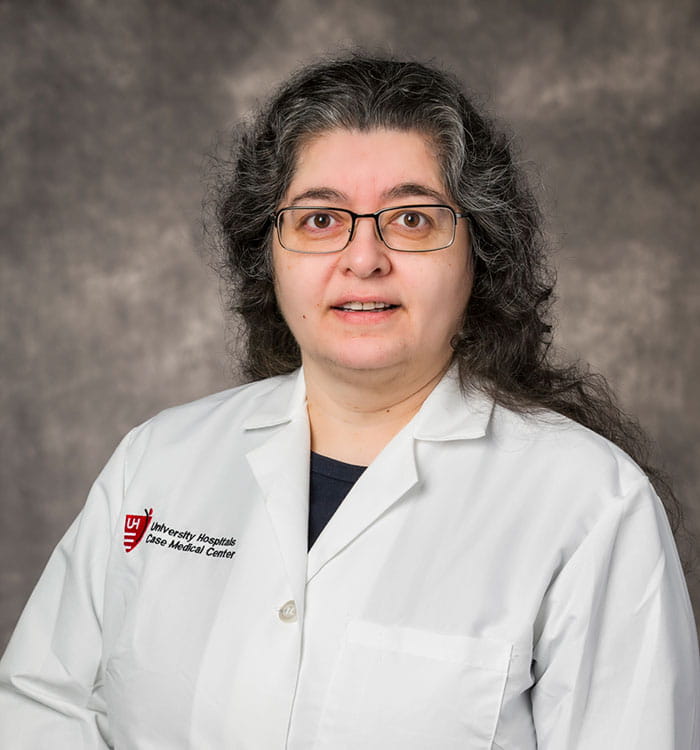Advancing COVID-19 Patient Care and Research in the ICU
February 15, 2021
Innovations in Pulmonary & Sleep Medicine | Winter 2021
The Intensive Care Unit at University Hospitals Cleveland Medical Center has had a busy year, caring for COVID-19 patients and furthering the collective knowledge of the coronavirus.
 Rana Hejal, MD
Rana Hejal, MD“When the coronavirus pandemic began, no one knew what we were up against,” says Rana Hejal, MD, Director, Medical Intensive Care Unit, UH Cleveland Medical Center, and Clinical Associate Professor, Case Western Reserve University School of Medicine. “We didn’t know how to manage patients, optimize treatment strategies or keep healthcare workers safe. I led the organization of the ICU to deliver the best care possible for all in the most systematic and common sense way using the finest scientific evidence available.”
The teamwork in the ICU has been remarkable, Dr. Hejal says. Everyone at every level in every department -- pitched in with a “yes, we can do this” attitude.
“Team members in the ICU have been taking care of the sickest of the sick at a much higher census than usual, with utmost professionalism, selflessness and kindness,” she says. The safety of patients and staff was top priority. “We’ve had a nearly zero hospital-acquired infection rate in the COVID ICU. As the volume of critically ill patients increased, we learned to cohabitate COVID and non-COVID patients in the same space efficiently and safely to accommodate all our patients.”
As initial cases of COVID-19 gave way to the pandemic, Dr. Hejal’s team created a working document dubbed “Mission Possible” to standardize patient care, facilitated participation in several significant clinical trials and worked on new ways to monitor patients and improve care.
MISSION POSSIBLE: SOLID CLINICAL MEDICINE
The COVID-19 pandemic represents an unprecedented challenge to intensive care services across the world. UH Cleveland Medical Center is fortunate to have a highly trained, professional critical care workforce able and ready to serve the community.
“The purpose of Mission Possible is to provide best practice management guidance for critically ill patients with COVID-19 admitted to any of our hospital ICUs,” says Dr. Hejal. To that end, her team developed and adapted pre-existing treatment algorithms with frequent updates as clinical evidence evolved.
“The MICU collaborated with anesthesia, infectious disease and emergency medicine. Together, we determined the best interventions needed, which was then adopted by critical care HRM and later got approved by our Incident Command Center to be available for all intensivists across the system,” Dr. Hejal says.
COVID-19 CLINICAL TRIALS
Another important effort was to work with the UH Clinical Research Center to select from among numerous COVID-19 trials underway. While some trials did not advance for a variety of reasons, UH participated in several noteworthy studies.
Dr. Hejal has been a co-investigator on many clinical trials in the ICU to evaluate new therapies for critical COVID-19. UH Cleveland Medical Center was one of the first sites in the United States to participate in an investigational study of the antiviral drug Remdesivir, evaluating its efficacy in treating COVID-19, under leadership of Leila Hojat, MD.
Other trials specific to patients in the ICU include evaluating therapies that modulate the immune response to COVID-19 to decrease the severity of disease. Grace McComsey, MD, served as primary investigator comparing different doses of Tocilizumab, a monoclonal antibody that decreases the immune response by binding to and inhibiting the activity of the IL-6 receptor. Additionally, Olivia Giddings, MD, ran two trials; one using Gimsilumab, a monoclonal antibody that inhibits granulocyte-macrophage colony-stimulating-factor, and the second using CD24Fc, a fusion protein that uses the immunoregulary protein CD24 to alter the body’s natural immune response to infection. Lastly, for mechanically ventilated patients, the MICU worked closely with Frank Jacono, MD, on a trial using an infusion of human mesenchymal stem cells in patients with severe acute respiratory distress syndrome (ARDS) due to COVID-19.
MONITORING PATIENTS TO IMPROVE CARE
Perhaps the most innovating this year was University Hospitals’ implementation of a real-time surveillance technology system, Advanced Clinical Guidance (ACG)-Remote View ICUTM, manufactured by Talis Clinical, to support higher acuity patient care.
A Talis Medical Device Integration (MD-iQ™) appliance was installed in each ICU room to collect discrete and waveform data from monitors and ventilators. The ICU developed evidence-based clinical protocols to guide protective ventilator strategy that was used by the cloud-based engine as it continuously collected and processed data. Real-time clinical and ventilator data along with decision support were delivered to clinicians on their mobile devices and enterprise dashboards.
“This is an ongoing project,” says Dr. Hejal. “This technology will probably forever change patient monitoring in the ICU.” She adds.
“UH is committed to provide the best clinical and critical care to patients with COVID-19 and to contribute to the growing body of research on this novel virus,” says Dr. Hejal.


